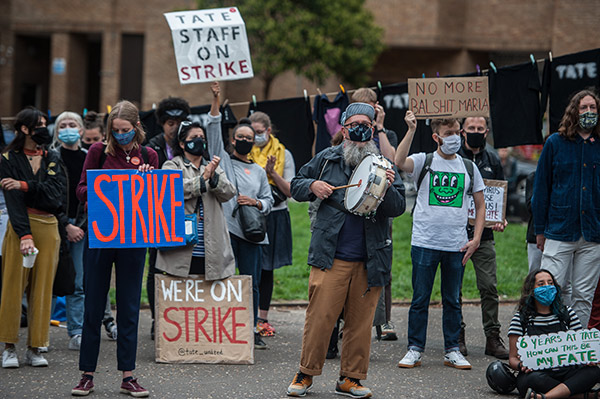More than 300 artists have signed an open letter expressing support for the striking Tate workers, the Guardian reports. The letter, which includes the signatures of former Turner prize winner Mark Leckey (2008) and joint-winners Lawrence Abu Hamdan, Helen Cammock, Oscar Murillo and Tai Shani (2019), demands Tate uses ‘10% of the £7m it received from the government to stop redundancies’.

The strike is a result of Tate Enterprises’s (TEL) announcement on 11 August via an email to its employees that 313 jobs (almost half of Tate’s retail and restaurant workforce) across the organisation’s publishing department and shops, cafes and restaurants in London, Liverpool and St Ives, would be made redundant. The workers have argued that money given to the organisation as part of the government’s arts support package is not being used to save jobs, resulting in ‘the most precarious workers across the culture sector will be expected to pay for the Covid-19 crisis’. The letter calls attention to the ‘multi-racial, multi-ethnic, multilingual, workers from low-income backgrounds’ who will be affected the most, while urging TEL to explore ‘new imaginative ways to save jobs and avoid outsourcing’.
‘We demand that there are no redundancies while senior staff earn more than £100,000,’ the letter continues. ‘Just 10% of the Tate’s £7m government bailout would be enough to save many of the TEL jobs. If the money isn’t enough, then Tate must demand more funding.’
According to the Guardian, a Tate spokesperson said: ‘Tate is facing a £50m shortfall in self-generated income this year. We are doing all we can to mitigate the impact of this, including on jobs. We are halving all budgets, freezing all but essential recruitment, a voluntary 10% pay cut has been taken by the executive group, and we continue to argue for more government support.’ Tate also added that a reduction in visitor numbers has meant that ‘there is simply not enough work to employ the same number of people in our shops and catering outlets as before’.